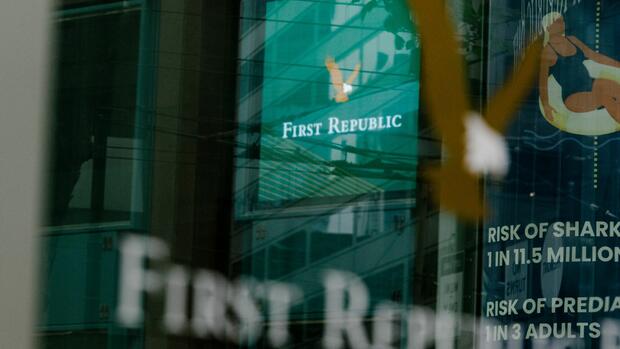The regional bank is to be subject to the FDIC and then resold directly.
(Photo: Bloomberg)
Denver The rescue of the crisis-ridden First Republic Bank is apparently more complicated than initially thought. US banks, including JP Morgan Chase and PNC, submitted takeover bids to the US deposit insurance fund FDIC on Sunday afternoon.
It was originally planned that the bank would be subject to the FDIC before the Asian markets opened on Monday night and then be sold on directly afterwards. It should therefore also be clear to the customers of the First Republic on Monday morning before the bank opens who has taken over the institute. This was discussed in financial circles over the weekend as the most likely solution.
But in the early hours of trading in Tokyo, from 2 a.m. German time, no buyer had yet been determined. The FDIC could not be reached for comment.
With the planned, quick resale, the FDIC wanted to choose a different approach than after the bankruptcy of the Silicon Valley Bank (SVB) and the New York Signature Bank in March. At that time it took around two weeks before parts of the institutes could be resold. However, the FDIC had to make big concessions and now assumes that the bank failures have caused costs of around $20 billion.
The FDIC is funded by bank membership dues and will need to increase these to fill the gap. As a result, the agency was now keen to find a cost-effective solution for the First Republic.
JP Morgan Chase’s bid could pose complications due to the bank’s sheer size, bankers speculated. America’s largest bank is one of the few major US banks that already account for more than 10 percent of the nation’s deposits. Therefore, under US regulations, the bank would need to obtain an exemption to accept additional deposits.
Cheap mortgage deals
The First Republic itself got into trouble in the course of the turbulence surrounding the SVB in March. Similar to the SVB, the First Republic also had a large proportion of wealthy customers who quickly withdrew their money in March amid concerns about the bank’s stability.
The California bank, which has total assets of $233 billion, was known for providing its customers with large mortgages on favorable terms. In the United States, home loans are often given at fixed interest rates and with a term of 30 years. However, these mortgages have lost a massive amount of their value due to the recently significant increase in key interest rates by the central bank, the Fed. According to Morgan Stanley, book losses on the bank’s loans and borrowings are $27 billion, resulting in negative equity.
Eleven major financial houses parked deposits totaling $30 billion with the First Republic in March to stabilize the institution and send a signal of confidence. This did not bring the desired success. The institutions, including JP Morgan Chase and PNC, but also Bank of America and Goldman Sachs, were not willing to participate in another rescue package without the support of the FDIC. JP Morgan had also advised the bank in recent weeks.
The First Republic’s stock had experienced sharp falls in prices in the past few days and fell again by 43 percent on Friday. After-hours trading, it then went down again by 33 percent. It has lost around 99 percent of its value since the beginning of the year.
More: Rescue plans for First Republic are taking shape
